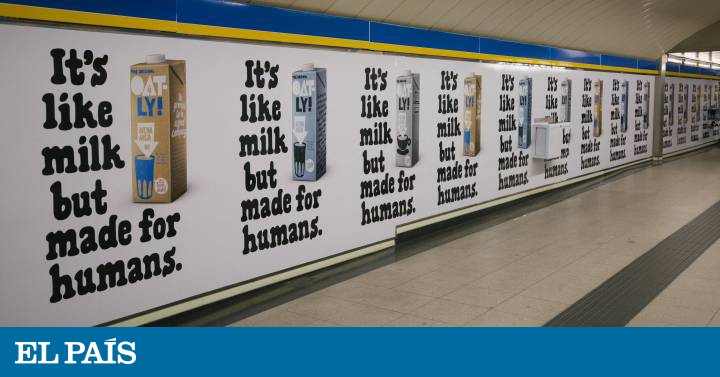I recently learned that the plant-based food industry and advocacy community has launched an online petition to, in their own words, "stop censorship of plant-based dairy."
Plant dairy is an impossible oxymoron to accept or a welcome neologism?
This is the
crux
of the matter.
MORE INFORMATION
From milking cows to squeezing them like lemons
The European Parliament says 'yes': a vegetable burger is a hamburger
Can it be a hamburger if it is vegetable?
Behind this campaign are NGOs and producers such as Proveg Internacional, Oatly and Upfield, among others.
Specifically, they call on consumers to oppose an amendment, the 171, approved not long ago by MEPs and that seeks to expand existing restrictions on the use of terms related to dairy in the description and packaging of foods of plant origin .
The use of "plant milk" or vegan cheese, for example, is already banned, but the amendment extends the veto to expressions such as "type", "style", "similar to", "substitute for".
Those restrictions could prohibit the use of phrases such as "does not contain milk" or "suitable for people with lactose intolerance."
Today the controversy is led by Amendment 171, which will be discussed at the end of January in the trilogues of the Common Organization of Agricultural Markets (CMO).
A few months ago the headlines were taken by Amendment 165, which wanted to prohibit the use of the expression "vegetable hamburger" on the label. The 165 was left in borage because it was finally rejected.
So "vegetable burger" is a neologism and not a "lie", the European Union
dixit
.
It would be almost comical, if it were not painful enough, this role that the European public administration confers on itself to decide what to call things, as if it were the Royal Academy of the Language.
And it is even more painful when one sees the distance that there is still often between the labeling of a product and the reality of its content.
European consumers cannot blindly trust the European authorities in the field of labeling
Is the interest of the consumer or the interest of the producer sector in question defended?
Do you bet on transparency and clarity in communication or rather try to maintain the
status quo
?
I know that when I buy oat milk it is not milk, of course, but I do not feel ripped off at all.
The metaphor is one of the intelligent and sophisticated uses that language allows.
To new products, new meanings for the old words and holy Easter.
That they do not allow writing on a label "does not contain milk" is not only being untrue, but even missing one of the fundamental principles of communication: that what the sender says is useful for the receiver.
And with that I am not breaking a spear in favor of plant food
per se
.
I do not claim that everything vegetable is good and healthy for the mere fact of being vegetable.
In France, the NGO Foodwatch raised the alarm last October over an ad by Daddy about his sugar.
The advertising appealed to the indisputably vegetable origin of sugar to induce one to think that, therefore, it had to be good for health as fruits and vegetables are.
Foodwatch regularly alerts about "deviations" in product labeling.
It has revealed pearls in France such as yogurts with fruits that do not contain fruit, supposedly healthy products that are loaded with sugar, others
"made in
France" that come from almost the five continents ... Much lies and no neologism.
It is a pity that Foodwatch has not yet landed in Spain.
Are we going to a new generation without milk and without meat as we have known them until now?
(c) Oatly
So from what I've seen, it seems hypocritical to look for fleas in new plant-based foods because they are not exactly what they claim to be.
The difference between "vegetable yogurts" and "yogurts with fruit ... that do not include fruit" is that, in the first case, the customer is aware of the metaphor and it is a convention accepted by everyone.
On the other hand, in the second case, the customer is the victim of a scam because he believes for sure that there is fruit in the yogurt.
Swindled by the producer, but also mistreated by the Administration, which presents itself to the public as a “guardian of the general interest”.
The underlying problem is that in reality we European consumers cannot blindly place our trust in the European authorities in this area.
What if instead of applying a double measure puritanism in the labeling with the supposed mission of protecting the citizen euro, we invest the money and the time in informing the consumer about what is good and what is bad for health and we leave to put doors to the field?
What respect do labels and their supposed “linguistic rigor” deserve when, even today, excesses and food scandals continue due to lack of traceability, control and sanctions in practice?
Luckily we have Yuka, and other similar mobile applications, which help us read (between the lines) the labels.
Applications, it goes without saying, that do not arise from public initiative, but from the disinterested and anonymous collaboration of thousands of citizens eager to know the truth and thus be able to make informed and reasoned decisions about their diet and health.

